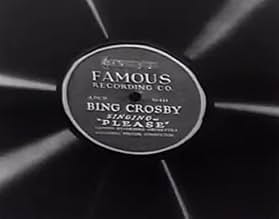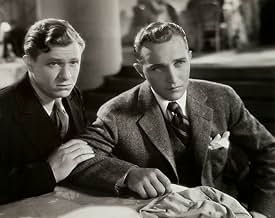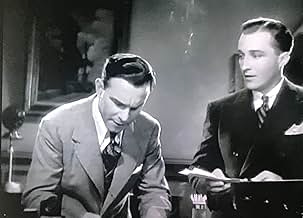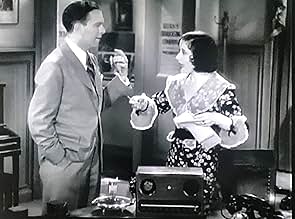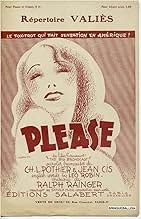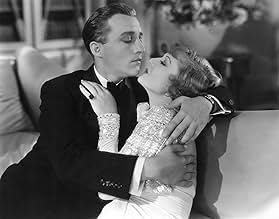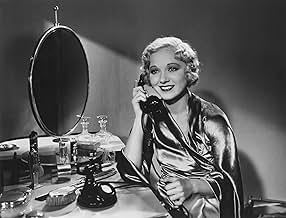Füge eine Handlung in deiner Sprache hinzuA radio-singer, Bing Crosby, is none-too-concerned about his job, and an affair with Mona leads to his dismissal. When it appears Hornsby is getting and paying a lot of attention to his fian... Alles lesenA radio-singer, Bing Crosby, is none-too-concerned about his job, and an affair with Mona leads to his dismissal. When it appears Hornsby is getting and paying a lot of attention to his fiancée, Anita Rogers, station manager Leslie McWhinney buys the station, gives Hornsby his jo... Alles lesenA radio-singer, Bing Crosby, is none-too-concerned about his job, and an affair with Mona leads to his dismissal. When it appears Hornsby is getting and paying a lot of attention to his fiancée, Anita Rogers, station manager Leslie McWhinney buys the station, gives Hornsby his job back, and goes on a honeymoon with Anita.
- Regie
- Drehbuch
- Hauptbesetzung
- Auszeichnungen
- 1 wins total
- George
- (as Burns and Allen)
- Gracie
- (as Burns and Allen)
Empfohlene Bewertungen
Bing's the star attraction of this one horse town radio station, appearing for Griptight Girdles on the Griptight Girdle Hour. That is when he can get to the studio. His job is being threatened and he's also coming between Stu Erwin who buys the station and Leila Hyams who's manager George Burns's secretary.
It's a thin plot, but nicely done and it's to show off some of radio's greatest talents of that year. In addition to Bing Crosby, appearing are Kate Smith, Arthur Tracy, the Boswell Sisters, Burns and Allen, Cab Calloway and Vincent Lopez with their respective orchestras, the Mills Brothers and tenor Donald Novis.
Bing gets to sing three numbers, Please and Here Lies Love which were written for this film and Dinah. Crosby made a classic recording of Dinah with the Mills Brothers and I wish they'd reprised that for the movie. Instead it's done with a black shoeshine boy giving him a beat with the rag while Bing is scatting like Ella Fitzgerald. Bing was great, but the staging is something that black people would find offensive. Please became a great early hit for him.
Here Lies Love is sung by Crosby, but he reprises it after it's been introduced by Arthur Tracy. Tracy, a Jewish immigrant from Russia, was billed as the Street Singer and had an almost operatic quality to his voice. He rivaled Crosby, Russ Columbo, Rudy Vallee, and Morton Downey in popularity as a radio singer, but American movie audiences didn't take to him. He went to Great Britain in the mid-30s and there he became a movie star. He went back to the US after World War II and only appeared sporadically after that. Tracy was fabulously wealthy due to good investments and lived to the age of 97. He did a cameo appearance in Crossing Delancey, you'll see him briefly discussing issues of the day over the pickle barrel there.
For Kate Smith, radio was a godsend. That beautiful and powerful voice was also trapped in an elephantine body like a Wagnerian opera soprano. She was never going to be a film star. But she was radio's most popular female vocalist, no one else was ever even close and she sings a great rendition of It Was So Beautiful in The Big Broadcast.
Burns and Allen did surreal comedy that was probably only equaled by Monty Python years later. Gracie Allen was in her own world and the ever patient George gave up trying to deal with her reasoning. They did some great guest bits in films like this one and two more with Bing Crosby. But they never really carried a film by themselves with the exception of Here Comes Cookie. I did a review of that and it's the best example of their work.
Donald Novis was a popular radio tenor, totally forgotten now. He also was on the Broadway stage and in Rodgers&Hart's Jumbo introduced their classic, The Most Beautiful Girl in the World. They give him Trees to sing, Joyce Kilmer's poem put to music. I wish he'd sung something more popular.
With all these radio stars it's hard to remember that the nominal star of the film is Stu Erwin. Erwin did a fabulous job in creating some great milquetoast characters from the early talkies. The climax of the film involves a long running gag with him trying to get a recording of Bing singing Please to the studio to substitute for Crosby who's AWOL. It's done almost without dialog and it is interspersed with several of the stars previously mentioned. It's a hilarious bit of slapstick.
The Big Broadcast is enjoyable nostalgic fun and a piece of history since it's the feature film debut of America's greatest entertainer, Bing Crosby.
This entire more is tongue-in-cheek, so if you like that humor, you'll split your sides laughing. Once, Stuart enters an empty room and says to the camera, "Hmm, no chair." From off-camera, someone literally slides a chair into frame for him to sit on. In another scene, Leila Hyams says, "First I cry because I'm happy, now I want to do something even sillier." Stuart guesses, "You want to laugh because you're sad?" The main plot of the movie involves a love triangle between Stuart, Leila, and Bing, and the film discusses the concept of hero worship, celebrity crushes, and real love. All that in a silly comedy? Well, when a comedy is a good comedy, it can revolve around actual topics while still including humor. So, the answer is yes.
In one scene, Bing and Stuart wake up in twin beds with no memory of what happened the night before. "This is my bedroom," Bing says, looking at the sheets. In the neighboring bed, Stuart asks, "Are we married?" Then, in pre-Code glory, the camera captures Leila's legs as she slips her negligee and underwear off then hops in the shower. Both Bing and Stuart talk to her while she's covered in only a shower curtain, and once she's fully dressed, Stuart shows her off and says, "Feel how solid she is!" Bing looks her up and down then asks Stuart where he should squeeze. Aren't pre-Code movies grand?
Unfortunately, once the "big broadcast" actually happens, during the last thirty minutes of the movie, it's full of radio acts and singers who are no longer household names today. Modern audiences will probably be very bored by the ending, but if you're bored, just remember the hilarity of the first part of the movie.
I give you three choices: 1) Watch the whole movie, to experience the drama, along with the actual 'big broadcast'. 2) Watch only the film beginning with the 60min mar, to delete most of the drama. 3)watch the YouTube 'the Big Broadcast 1932 excepts': a 12 min. Extraction of what are considered the most entertaining musical numbers of the actual 'big broadcast'. The musical performances during the actual 'big broadcast' include the following: 1) the Mills Brothers sing "Tiger Rag" I don't know how the one manages to make a very good imitation of a musical instrument with just his hands together. 2)The Vincent Lopez orchestra does a rather amusing novelty number 3)Vincent Novis sings the inspirational song "Trees" (Only God can make a tree) 4) The 3 Boswell sisters sing the jazzy "Crazy People" 5 )Kate Smith sings an inspirational number 6 )Cab Calloway dances around while singing "Minnie the Moocher", backed up by his band. Lastly, Stuart tries to mimic Bing, who is late, in singing "Please". Eventually, Bing shows up, and sings the last part. You also get a brief look at the luscious Leila, if you haven't already,. Mona is also present, with an unexplained black eye(she was last seen in Bing's company).
If you aren't familiar with the 3 Boswell Sisters, they grew up in New Orleans during the birth of jazz there, which influenced much of their music. They were very popular on radio, as well as records from mid '20s to mid '30s, encompassing the late 'jazz Age' and early 'Swing Era'. The Andrew sisters took over their spot in the late '30s and 40s, during the height of the 'Swing Era' and WWII. Hence, they tend to be more remembered, although they learned much from the Boswell Sisters. The McGuire Sisters then largely replaced the Andrew Sisters in the'50s, I tend to remember the McGuire Sisters the least of these 3. There are several songs by the Boswell Sisters at YouTube, or you can buy one of the several CDs of their music currently available.
The slight plot revolves around Bing Crosby (Bing Crosby), the most popular singer at WADX Radio Station in New York City. Due to his constant lateness, Mr. Clapsaddle (George Barbier), the upset sponsor, forces radio manager, George Burns (George N. Burns) to have Crosby fired. Anita Rodgers (Leila Hyams), Burns' secretary, silently loves Bing, though he fails to notice her. Bing is engaged to marry dancer, Mona Lowe (Sharon Lynn), the one responsible for his irresponsible behavior. While celebrating his final days as a bachelor with his friends at a speakeasy, Bing sees a newspaper article of Mona eloping with a broker and jilting Crosby. After befriending an equally depressed Leslie McWhinney (Stuart Erwin), a Texas oil man jilted by the girl he loves and being taken for $100,000 by a gold-digging widow, Bing invites the poor soul to his apartment where he plans a double suicide. Bing's plot fails with the arrival of Anita, Leslie's girlfriend from back home, with the news of Mr. Burns agreeing to give Bing his job back now that he's no longer engaged to be married. As Bing arranges to find Leslie a job at the studio, warrant officers turn up to close down the station. With his remaining $900,000, Leslie buys the radio station and becomes its president. All goes well until Mona Lowe returns to Bing life again, making him irresponsible once more. Here lies love.
With old and new tunes (by Leo Robin and Ralph Rainger) combined for THE BIG BROADCAST, the musical program features that of "Dinah" (sung by Bing Crosby); "Speakeasy" (sung by telephone operators, Major, Sharp and Minor); "Here Lies Love" (sung by Arthur Tracy); "Here Lies Love" (reprised by Crosby); "Please" (Crosby); "Tiger Rag" (sung by the Four Mills Brothers); "Please" (reprise by Crosby); "I'm the Drummer" (sung by Vincent Lopez); "Trees" (sung by Donald Novis); "Crazy People" (sung by The Boswell Sisters); "It Was So Beautiful" (sung by Kate Smith); "Kicking the Gong Around" (sung by Cab Calloway); and "Please" (finale). At one point in history, a motion picture soundtrack of THE BIG BROADCAST was available through Sandy Hook records in the 1980s, but the movie itself thus far has never been distributed to home video.
The comedy team of George Burns (radio manager) and Gracie Allen (the receptionist) incorporate their vaudeville routines as part of the plot on two separate occasions rather than during the on-screen radio broadcast. The movie also acquires the brief glimpses of actual radio announcers (James Wallington, Donald Ball, William Brenton and Norman Brokenshire) introducing the upcoming acts. Paramount pulls no stops on broad comedy, whether cartoonish, the use of high speed projection, laughing toy horses or even allowing material reminiscent to those silent comedy era through situations enacted through radio theme music but no inter-titles as the hapless Leslie tries in vain to acquire a Bing Crosby record and prevent himself from either losing or damaging it.
Commonly presented on broadcast television in the 1970s and public television a decade later, the only known cable TV showing in latter years for THE BIG BROADCAST happened to be from American Movie Classics (1990-91). Due to its enormous popularity and career launching of Bing Crosby, Paramount repeated its success with follow-up sequels in name only: THE BIG BROADCAST OF 1936 (1935), 1937 (1936) and 1938 (1938), with the 1938 edition being notable for the feature film introduction of Bob Hope, Crosby's on-screen partner in seven installments to "The Road to" comedy series from 1940-1962. Regardless of surreal plot and situations, THE BIG BROADCAST is nostalgic in its own little way, and should still be of entertaining value even today. One final note: Why do many references refer to Crosby's role as Bing Hornsby? He's addressed and billed as Bing Crosby throughout the entire story. And now, The Big Broadcast. (**1/2)
Wusstest du schon
- WissenswertesBing Crosby's song "Please" became the inspiration for John Lennon to write the Beatles' first hit "Please, Please Me"
- Zitate
Anita Rogers: I love somebody else.
Leslie McWhinney: Whoever he is, he's a fool if he can't see you.
Anita Rogers: [after a long pause] It's Bing.
Leslie McWhinney: Bing?
- Crazy CreditsFilm opens with loudspeakers, then segues to lobby cards depicting several of the featured stars "Live".
- VerbindungenEdited into The Great Radio Comedians (1972)
- SoundtracksMinnie the Moocher
Written by Clarence Gaskill, Cab Calloway and Irving Mills
Performed by Cab Calloway
Top-Auswahl
Details
- Erscheinungsdatum
- Herkunftsland
- Sprache
- Auch bekannt als
- The Crooners
- Drehorte
- Produktionsfirma
- Weitere beteiligte Unternehmen bei IMDbPro anzeigen
- Laufzeit
- 1 Std. 28 Min.(88 min)
- Farbe
- Seitenverhältnis
- 1.37 : 1

